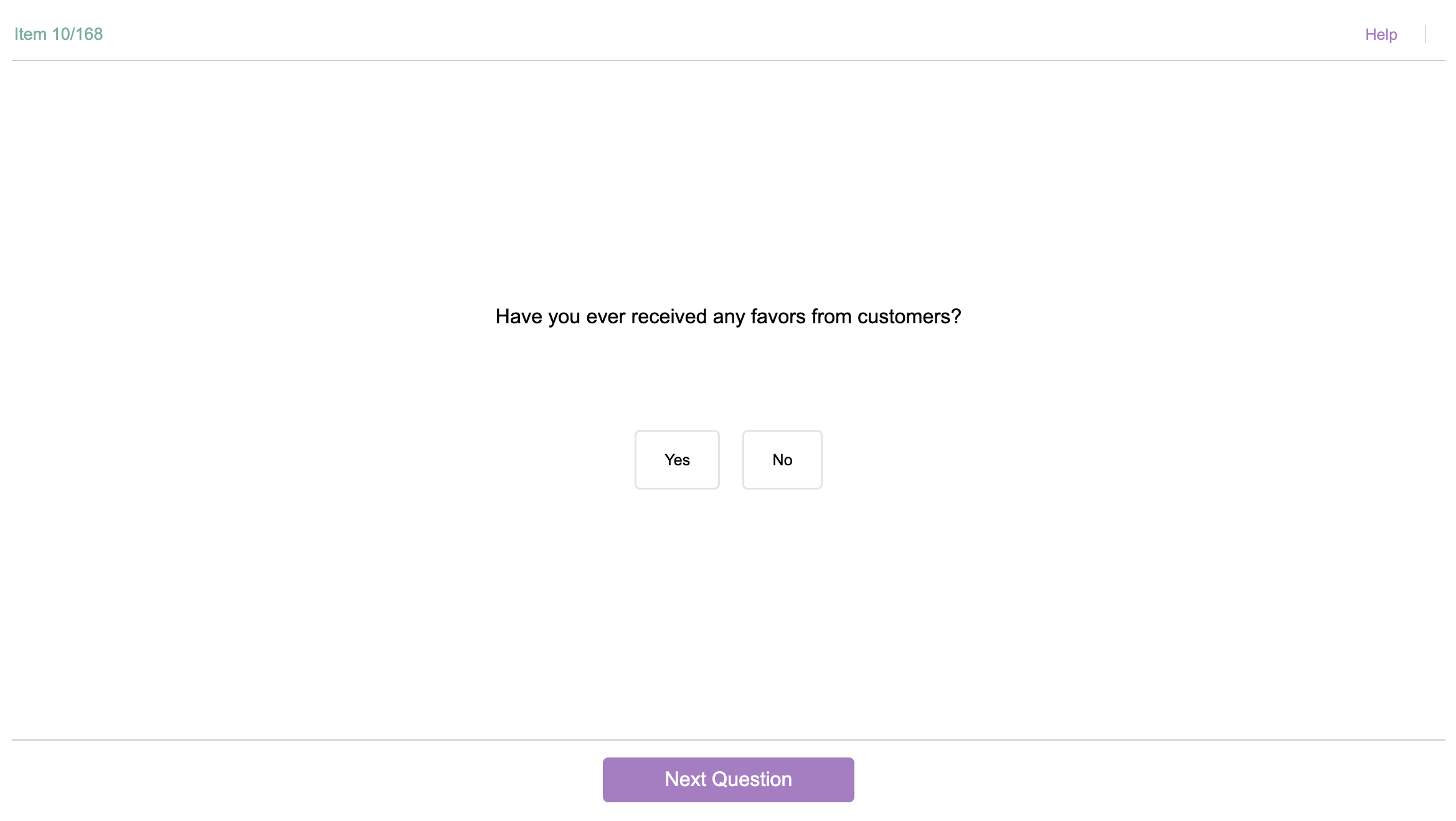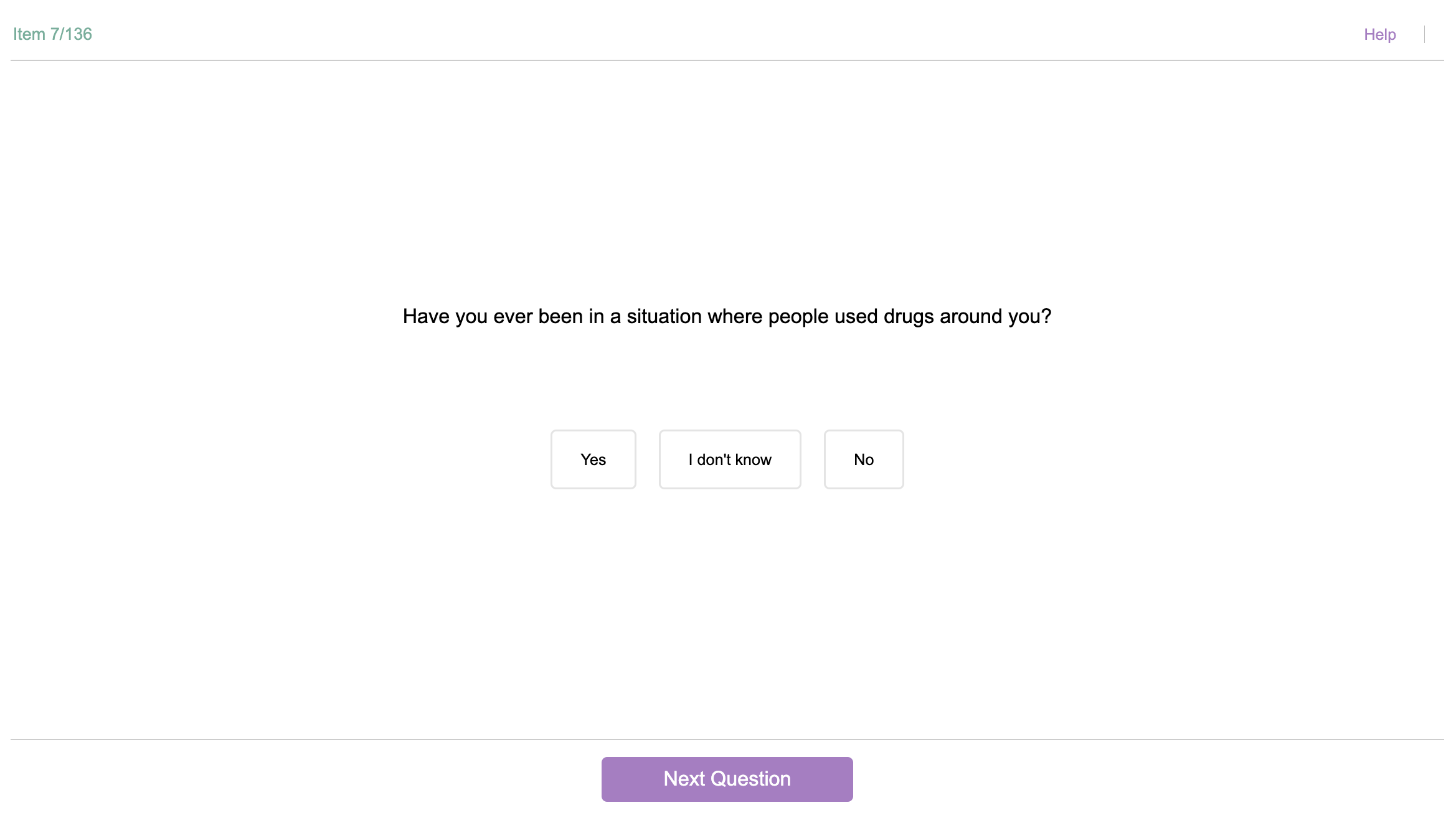Many companies around the world use a computerized integrity test (also called an honesty test) as part of their hiring process. Integrity tests include questions that either inquire about your background or ask about opinions on different subjects to try and detect undesirable character traits.
The challenge in such a test is to figure out what ambiguous and seemingly unrelated questions actually mean and how to answer them in a way that reflects your true values.
This page provides answers to the following questions:
- What do integrity tests evaluate?
- What questions will appear? try sample integrity test questions
- How to answer integrity questions? how honest should you be?
Before we dig into what integrity tests are, let's look at a typical integrity test question:
Most people act according to rules and procedures
How would you answer?
One of the first things you may have noticed is that it is very difficult to determine what this statement attempts to evaluate. You may think this statement is naive and examines the ability to express your opinion directly and honestly and to see the world as it is. However, this statement does not assess honesty or how accurate we are, but our stance on behaviors related to reliability and integrity.
Therefore, the appropriate answer is "agree".
What Is an Integrity Test?
An integrity test is a self-reporting test containing questions about your personality traits, behaviors, opinions, and values on issues related to honesty and reliability such as interpersonal relationships, workplace loyalty, work ethic, working with company money, and more. They can also examine problematic personal backgrounds with questions about criminal records, debts, chronic disease, drug or alcohol abuse, etc.
Integrity tests have a time limit, and every question is accompanied by a stopwatch-like graphic that shows the candidate how much time they have left to answer the question. Some tests will allow candidates to answer after the time runs out, while others will not. Your response time for each question might also be recorded to be later used to evaluate your answers.
Integrity Test Questions
The statements below are from real integrity tests. While in a real integrity test, you will be asked to answer whether you agree or disagree with the statement, here we aim to help you understand what each statement tests. This is important because understanding what exactly you’re being asked is the true challenge of reliability tests. As such, we included three different statements, each representing a different candidate quality or trait.
In the three questions below, try to identify what the is the main evaluated trait or quality in each question:
An employee that has given false information regarding workplace alcohol consumption by another employee should be fired.
Answer & Explanation
While one could imagine that this statement tests interpersonal skills and management capabilities (since it discusses relations between colleagues and a decision to fire an employee), the principal aspect evaluated by the question is your view of alcohol use in the workplace.
In order to realize our basic rights in this country, we have no choice but to be forceful.
Answer & Explanation
The statement appears to point us to our life experience and our understanding of the proper way to deal with the authorities. This may seem to evaluate system understanding or qualities such as assertiveness or dominance. However, the statement evaluates our basic belief in our ability to realize our rights while acting decently and ethically.
Do you sometimes feel the desire to swear?
Answer & Explanation
This question is part of a special ranking scale that is intended to evaluate the validity of the test itself. Since the statement describes a behavior considered ‘rude’ or ‘undesirable’, one may imagine that this question evaluates undesirable behavioral traits, such as impulsiveness or aggressiveness. However, the question checks our tendency to change our answers to fit expectations.
Since most people feel the desire to swear sometimes, candidates who answer ‘no’ may be thought of as wanting to please the examiner. Multiple answers of this type may reduce the candidate’s integrity score.
Integrity Test Questions Explained
Honesty test questions evaluate your attitude to various illegal or undesirable behavior by either asking directly about your attitudes and past experiences of shady behaviors, or indirectly asking about general preferences and interests in your life.
Accordingly, questions in an honesty test are divided into direct/overt integrity questions and veiled-purpose questions:
Overt Integrity Questions
Overt Integrity Questions are designed to ask applicants about their attitudes toward specific dishonest actions, particularly theft, and their past involvement in such behavior.
Examples of Overt Integrity Questions:
- Do you think that you are too honest to take something that is not yours?
- How much do you dislike doing what someone tells you to do?
- Do you think it is stealing to take small items home from work?
- Do you believe that taking paper or pens without permission from your work place is stealing?
- Do you believe most employers take advantage of the people who work for them?
Here is an example of this kind of integrity question as may appear in the test:

*Source - JobTestPrep Integrity Test Practice Pack
Veiled Integrity Questions
Veiled Integrity Questions ask candidates about their attitude towards a range of seemingly unrelated issues. As you can see below, it is often not clear what quality is being evaluated, and what is the expected reliable answer.
Examples of Veiled-Purpose Questions
- True or False: I like to take chances.
- On average, how often during the week do you go to parties?
- True or False: I am usually confident about myself.
- I feel lonely even when I am with other people {all of the time, most of the time, sometimes, almost never, never}.
- How often do you make your bed (every day, never, etc.)?
Here is an example of a Veiled Purpose question similar to one you could see on an integrity test:

*Source - JobTestPrep Integrity Test Practice Pack
Learn to interpret and answer any integrity test question
JobTestPrep's Integrity Test Preparation Pack includes 31 practice tests designed to help you:
- Interpret questions correctly using detailed study guides and test feedback reports.
- Learn how to answer in a way that matches your actual values and employers' expectations, as opposed to adjusting your answer to what you assume questions ask, by practicing full simulations and focused practice tests for each of the 14 evaluated topics.
- Get familiar with any kind of question and strengthen your confidence by taking full simulation tests.
When Will You Have to Pass an Integrity Test?
Integrity tests appear most commonly in the hiring stage, but they are also used when employees are transferred between different positions within the same company.
Integrity tests are commonly given in addition to personality assessments and situational judgment tests. They are specifically common in Insurance and investment companies, banks, and other companies in the financial sphere, as well as in federal positions recruitment and other governmental, public service, and security-related fields.
Integrity Tests: What Are They For?
Employers entrust their employees with the well-being of their business and need to be able to trust them to act honestly and reliably. To make sure employees can be trusted, employers ask to identify potential risks before their employment.
Different integrity tests examine your behavior in a similar way but focus on different types of questions and different aspects of your behavior. For example:
- The CISI IntegrityMatters test asks a lot of questions that focus on typical workplace situations.
- The IP2000 test, on the other hand, is a psychometric integrity test that focuses more on questions about the candidate’s general attitudes and traits.
- The Veritas Integrity Test is known for being very brief (taking about 25 minutes) and focuses on rooting out ‘delinquent behaviors’ such as gambling and drug use.
Create Your Own Assessment Prep Kit!
Finding a job can be a lengthy and challenging journey, often stretching over months and requiring multiple pre-employment tests and interviews. With our Premium Membership, you'll have the support you need every step of the way.
Mix & match 3 Preparation Packs at 50% discount for 1,3, or 6 months
Preparing for Integrity Tests
There are many cases of reliable, trustworthy candidates who cannot pass integrity tests and cannot figure out why. Most often this happens because candidates don't understand what lies behind the questions, answer in a too strict and rational a way, Over-trying to impress the employer, or answer authentically thinking it will express their reliability.
Preparing for integrity tests improves candidates' confidence and their chances of successfully expressing ethical values and opinions.



